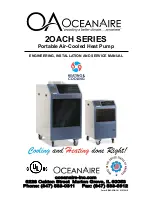
Page 11
Figure 12
10HPB Manifold Gauge Connections (Cooling Cycle)
outdoor
coil
defrost thermostat
expansion/
check valve
biflow
filter / drier
to
HCFC−22
drum
low
pressure
high
pressure
compressor
reversing valve
vapor
line
valve
muffler
Note − Arrows indicate the direction of refrigerant flow.
vapor
service
port
expansion/check
valve
Indoor Unit
Outdoor Unit
liquid line
service
port
gauge manifold
distributor
indoor
coil
Service Valves
The liquid line and vapor line service valves (figures 13 and
14) and gauge ports are used for leak testing, evacuating,
charging and checking charge. See table 3 for torque re-
quirements.
Each valve is equipped with a service port which has a fac-
tory−installed Schrader valve. A service port cap protects
the Schrader valve from contamination and serves as the
primary leak seal.
Table 3
Torque Requirements
Part
Recommended Torque
Service valve cap
8 ft.− lb.
11 NM
Sheet metal screws
16 in.− lb.
2 NM
Machine screws #10
28 in.− lb.
3 NM
Compressor bolts
90 in.− lb.
10 NM
Gauge port seal cap
8 ft.− lb.
11 NM
IMPORTANT
Service valves are closed to the outdoor unit and
open to line set connections. Do not open the valves
until refrigerant lines have been leak tested and
evacuated. All precautions should be exercised to
keep the system free from dirt, moisture and air.
To Access Schrader Port:
1 − Remove service port cap with an adjustable wrench.
2 − Connect gauge to the service port.
3 − When testing is completed, replace service port cap.
Tighten finger tight, then an additional 1/6 turn.
To Open Liquid or Vapor Line Service Valve:
1 − Remove stem cap with an adjustable wrench.
2 − Use a service wrench with a hex head extension to back
the stem out counterclockwise as far as it will go.
NOTE − Use a 3/16" hex head extension for liquid line
sizes or a 5/16" extension for vapor line sizes.
3 − Replace stem cap. Tighten finger tight, then tighten an
additional 1/6 turn.
To Close Liquid Line Service Valve:
1 − Remove stem cap with an adjustable wrench.
2 − Use a service wrench with a hex head extension to turn
the stem clockwise to seat the valve. Tighten firmly.
NOTE − Use a 3/16" hex head extension for liquid line
sizes or a 5/16" extension for vapor line sizes.
3 − Replace the stem cap. Tighten finger tight, then tighten
an additional 1/6 turn.
Ball−Type Vapor Line Service Valve
Vapor line service valves function the same way as the oth-
er valves, the difference is in the construction. These
valves are not rebuildable. If a valve has failed, you must
replace it. A ball valve valve is illustrated in figure 14.




































